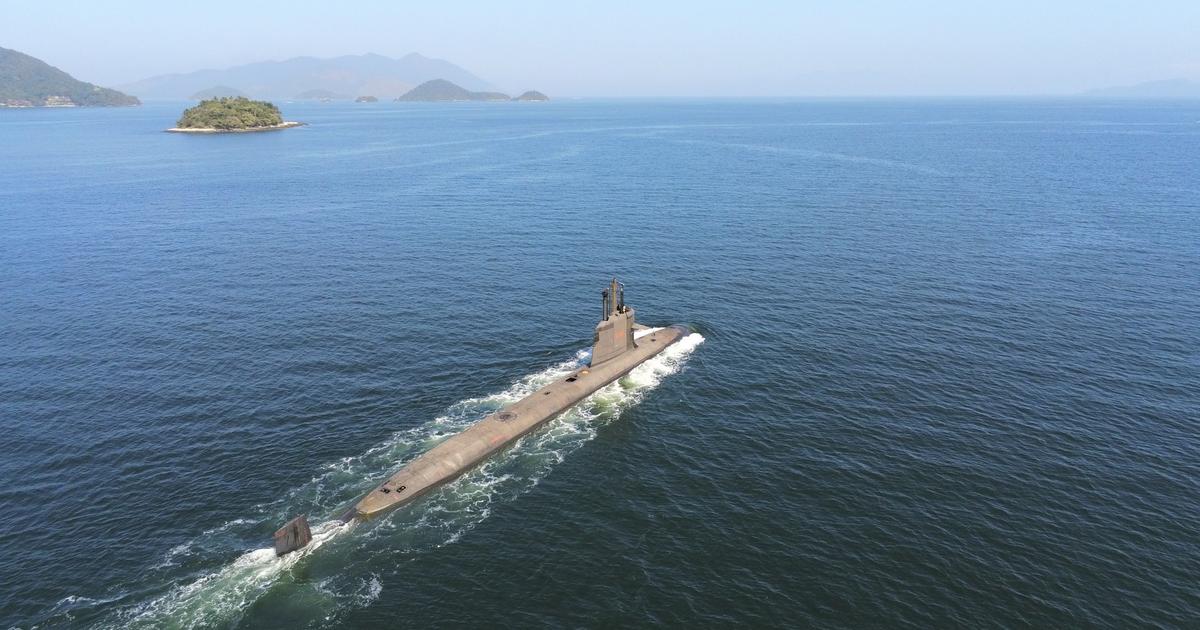“Aukus” has outraged France enormously.
That seems a little hypocritical when you think of Paris' own arms deals.
A broken submarine deal between Australia and France made waves in September.
France felt that it had been betrayed - but has repeatedly closed daring deals itself in the past.
In this commentary, the author, documentary filmmaker and publicist Michael Moran takes a hard line against the French arms policy - but also with that of the USA.
This article is available for the first time in German - it was first published by
Foreign Policy
magazine on September 27, 2021
.
London - When it comes to demonstrating outrage, no one can hold a candle to the French.
The revelation that the United States, the United Kingdom and Australia have signed a new defense agreement - commonly known as AUKUS * - is said to have reached the Quai d'Orsay, the French Foreign Ministry, "through media reports". AUKUS came up with a perfidious Anglo-Saxon deal that supplies Australia with previously secret nuclear submarine technology and enables the Australians to negotiate a poorly thought-out $ 65 billion contract for twelve French-made diesel-electric submarines of the Barracuda type Throwing board. A major blow to the French defense industry, the third largest in the world after the United States and Russia, and an even greater blow to the pride of the French.
There was, of course, a demarche and prominent French officials and public figures have voiced their displeasure.
“Double the game!” Declared French Foreign Minister Jean-Yves Le Drian.
“Treason,” complained the French ambassador to Washington, Philippe Etienne.
"A public humiliation," said right-wing populist politician Marine Le Pen.
AUKUS affair: France is exhausting the symphony of displeasure - in 2014 it itself caused an uproar
And to underline this symphony of resentment, Paris called Etienne back to France, a step that was once reserved for moments when two countries were on the verge of war. After a brief telephone diplomacy between US President Joe Biden and French President Emmanuel Macron, Etienne made her way back to the Beltway. After a week of moaning about the miserable treatment by the Anglo-Saxons, it was perhaps slowly dawning on the French that they had an
unmatched
record of duplicity
even at the global arms bazaar
.
Just a few years ago, in 2014, the Obama administration was grappling with another type of French naval arms debacle: Paris' decision to sell two large helicopter carriers to Russia. When I wrote about the controversial sale in 2014, just months after Russia invaded and annexed Crimea, the French Defense Minister at the time, the same Le Drian, who is so upset about duplicity today, claimed the sale would definitely be take place because France only wants to deliver unarmed "civilian ships" to Vladimir Putin's navy.
It was another four months before the French canceled the sale of the two Mistral-class aircraft carriers to Moscow and Paris repaid the entire $ 1.2 billion down payment made by Russia.
Had it not been for Putin's adventurism in Crimea, the two ships would sail under the Russian naval flag, regardless of the energetic arguments of US officials and France's alarmed Eastern European NATO allies.
France ignored the concerns of the allies on several occasions - also angry Britain
It wasn't the first time France had ignored the concerns of its allies in order to start selling arms. An even more significant episode came in 2009 when the French made another submarine deal, this time for a nuclear submarine, with Brazil. In view of the mess that Brazil has gotten into since then *, it's easy to forget that, but at that time double-digit growth rates and a lot of stupid talk about the BRICS emerging countries (Brazil, Russia, India, China and South Africa) left the then Brazilian head of state Luiz Inácio Lula da Silva believe that his country could gradually sit at the table of the mighty. So he ordered a nuclear attack submarine, and the French were only too happy to meet him.
That raised some concerns in Britain - which still retains sovereignty over the Falkland Islands after a brief, ugly war fought over the islands after the Argentine occupation of the islands in 1982. Although the Royal Navy had a bloody nose when it was retaken, the British admirals were hardly afraid of sending a fleet to the South Atlantic to oppose the Argentines. Brazil supports Argentina's continued claim to the islands, and while barely hostile to the UK, the presence of a Brazilian nuclear submarine changes the strategic rationale in the region. The same goes for the discovery of oil off the Falkland Islands in 2010.
France is building Brazil's only nuclear underground book - until at least 2034
Britain's fears about the South Atlantic may be misplaced, but the fact is, France either way didn't bother.
Brazil’s only nuclear attack submarine, SSN
Álvaro Alberto
,
is currently under
construction and is not expected to be operational before 2034.
Current estimates suggest that
Alberto
will cost $ 7.4 billion, which does not make up for the $ 65 billion France lost to the Australian submarine deal, nor the $ 1.2 billion it had to repay Putin.
As has been emphasized by many, AUKUS makes much more sense in the long run for Australian national defense - and the general Western interest in countering China's aggressive behavior in the Asia-Pacific region - than continuing to build French boats, the original cost of which is due to them of delays, cost overruns and the usual machinations of the arms industry had already doubled.
This is also in line with the emerging Biden Doctrine, which can best be described with the words: "Do the right thing, but do it really badly."
USA and the Aukus affront - Biden's strategy: bow to the inevitable and upset pretty much everyone
Like the failed withdrawal from Afghanistan, which also surprised the allies, and the less spectacular but still fainthearted relenting of the German Nord Stream 2 pipeline - a strategic victory for Russia after Ukraine and Poland pleaded with the United States for intervention - the most important foreign policy decisions made by Joe Biden * so far show a common tendency: to bow to the inevitable and to annoy pretty much everyone in the process. Now the French are angry too, but given their own past arms deals, it's hard to take them seriously.
It is very likely that this episode will end as quickly as it began, similar to previous alleged insults of French honor: the Freedom Fries affair leading up to the Iraq war, the outrage over US resistance against the French - British attempt to wrest the Suez Canal from Egypt in 1956 and the shameful memory of the Anglo-Saxons' liberation from their own collaborating government on D-Day.
All of this is a good reminder that those who elevate indignation to art have very selective memories.
And while the submarines France hoped to sell were barracudas, the tears shed by French officials are more like those of a crocodile.
by Michael Moran
Michael Moran
is a writer, documentary filmmaker, and global affairs commentator, and a senior executive at Microshare, a global smart building, data intelligence, and sustainability company.
This article was first published in English on September 27, 2021 in the magazine “ForeignPolicy.com” - as part of a cooperation, a translation is now also available to readers of the IPPEN.MEDIA portals. * Merkur.de is an offer from IPPEN.MEDIA.
+
Foreign Policy Logo
© ForeignPolicy.com









